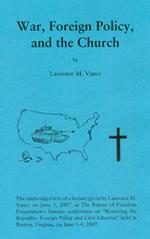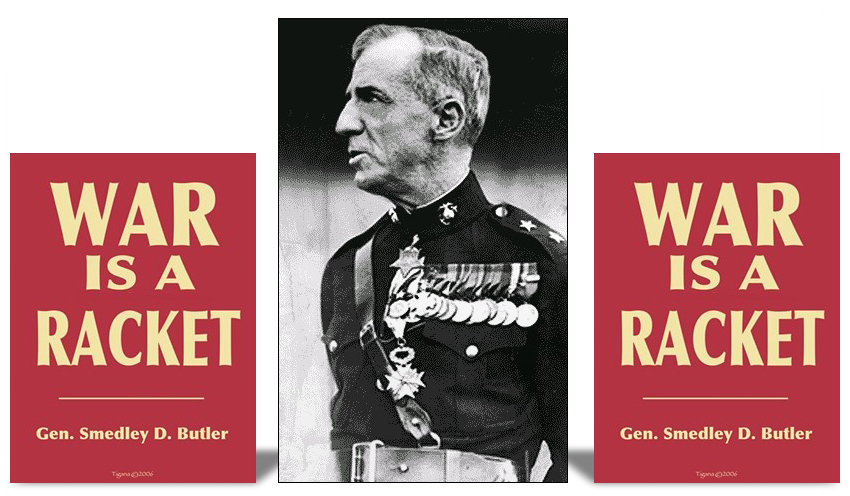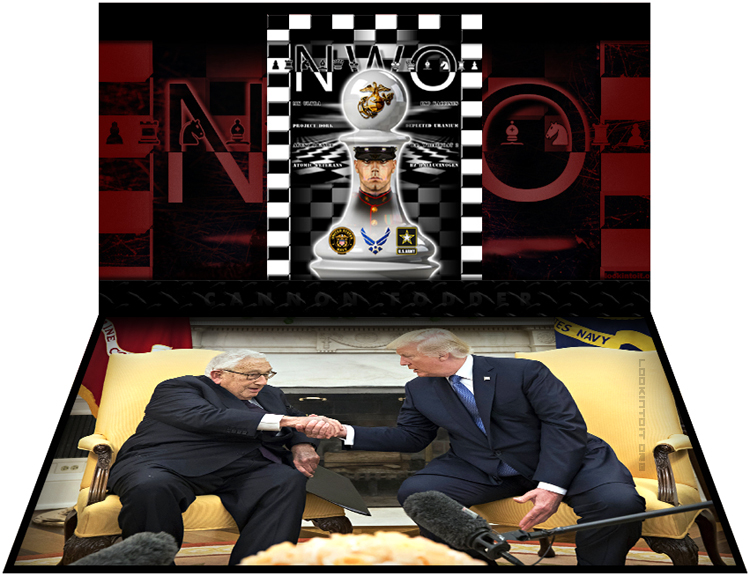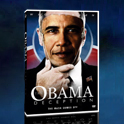welcome
|
|||||||||||||||
______WAR______ These 127 essays, although organized under seven headings, have one underlying theme: opposition
to the warfare state that robs us of our liberty, our money, and in some cases our life. Conservatives who decry
the welfare state while supporting the warfare state are terribly inconsistent. The two are inseparable.
Libertarians who are opposed to war on principle, but support the state’s bogus “war on terrorism,” even as they
remain silent about the U.S. global empire, are likewise contradictory. In chapter 1, “War and Peace,” the evils of war and warmongers and the benefits of peace are examined. In chapter 2, “The Military,” the evils of standing armies and militarism are discussed, including a critical look at the U.S. military. In chapter 3, “The War in Iraq,” the wickedness of the Iraq War is exposed. In chapter 4, “World War II,” the “good war” is shown to be not so good after all. In chapter 5, “Other Wars,” the evils of war and the warfare state are chronicled in specific wars: the Crimean War (1854–1856), the Russo-Japanese War (1904–1905), World War I (1914–1918), the Persian Gulf War (1990–1991), and the war in Afghanistan (2001–). In chapter 6, “The U.S. Global Empire,” the beginnings, growth, extent, nature, and consequences of the U.S. empire of bases and troops are revealed and critiqued. In chapter 7, “U.S. Foreign Policy,” the belligerence, recklessness, and follies of U.S. foreign policy are laid bare. Chapter One - War and Peace ______[p1]
Listen to "Christianity and WAR" on Spreaker.
WAR
Dr. Gates vs. Dr. Paul
January 3, 2008
What is the purpose of the military? I think it is beyond dispute that the purpose of any country
having a military is to defend the country against a foreign attack or invasion. One would think that someone in
the United States called the Secretary of Defense would know this. Yet, in his remarks on October 10, 2007, before the
Association of the United States Army (a private, non-profit advocacy group
for the U.S. Army), Defense Secretary Robert Gates envisioned a new role
for the U.S. Army: Army soldiers can expect to be tasked with reviving public services, rebuilding
infrastructure and promoting good governance. All these so-called nontraditional capabilities have moved into
the mainstream of military thinking, planning, and strategy — where they must stay. In his speech Secretary
Gates also acknowledged that “U.S. forces will play some role in Iraq for years to come.”
Can U.S. Foreign Policy Be
Fixed?
The Future of Freedom Foundation January 4, 2011 The WikiLeaks revelations have shined a light on the dark nature of U.S. foreign policy. As Eric Margolis recently described it: “Washington’s heavy-handed treatment of friends and foes alike, its bullying, use of diplomats as junior-grade spies, narrow-minded views, and snide remarks about world leaders.” As much as I, an American, hate to say it, U.S. foreign policy is actually much worse. It is aggressive, reckless, belligerent, and meddling. It sanctions the destabilization and overthrow of governments, the assassination of leaders, the destruction of industry and infrastructure, the backing of military coups, death squads, and drug traffickers, and imperialism under the guise of humanitarianism. It supports corrupt and tyrannical governments and brutal sanctions and embargoes. It results in discord, strife, hatred, and terrorism toward the United States. The question, then, is simply this: Can U.S. foreign policy be fixed? Although I am not very optimistic that it will be, I am more than confident that it can be. I propose a four-pronged solution from the following perspectives: Founding Fathers, military, congressional, libertarian. In brief, to fix its foreign policy the United States should implement a Jeffersonian foreign policy, adopt Major General Smedley Butler’s Amendment for Peace, follow the advice of Congressman Ron Paul, and do it all within the libertarian framework of philosopher Murray Rothbard. Thomas Jefferson, our first secretary of state and third president, favored a foreign policy of “peace, commerce, and honest friendship with all nations – entangling alliances with none.” This policy was basically followed until the Spanish-American War of 1898. Here is the simple but profound wisdom of Jefferson: No one nation has a right to sit in judgment over another. We wish not to meddle with the internal affairs of any country, nor with the general affairs of Europe. I am for free commerce with all nations, political connection with none, and little or no diplomatic establishment. We have produced proofs, from the most enlightened and approved writers on the subject, that a neutral nation must, in all things relating to the war, observe an exact impartiality towards the parties. No judgment, no meddling, no political connection, and no partiality: this is a Jeffersonian foreign policy. U.S. Marine Corps Major General Butler was the most decorated Marine in U.S. history. After leaving the military, he authored the classic work . Butler proposed an Amendment for Peace to provide an “absolute guarantee to the women of America that their loved ones never would be sent overseas to be needlessly shot down in European or Asiatic or African wars that are no concern of our people.” Here are its three planks:
Butler also reasoned that because of “our geographical position, it is all but impossible for any foreign power to muster, transport and land sufficient troops on our shores for a successful invasion.” In this he was echoing Jefferson, who recognized that geography was one of the great advantages of the United States: “At such a distance from Europe and with such an ocean between us, we hope to meddle little in its quarrels or combinations. Its peace and its commerce are what we shall court.” And then there is our modern Jeffersonian in Congress, Rep. Ron Paul, the only consistent voice in Congress from either party for a foreign policy of peace and nonintervention. In a speech on the House floor several months before the invasion of Iraq, Ron Paul made the case for a foreign policy of peace through commerce and nonintervention: A proper foreign policy of non-intervention is built on friendship with other nations, free trade, and open travel, maximizing the exchanges of goods and services and ideas. We should avoid entangling alliances and stop meddling in the internal affairs of other nations – no matter how many special interests demand otherwise. The entangling alliances that we should avoid include the complex alliances in the UN, the IMF, the World Bank, and the WTO. The basic moral principle underpinning a non-interventionist foreign policy is that of rejecting the initiation of force against others. It is based on non-violence and friendship unless attacked, self-determination, and self-defense while avoiding confrontation, even when we disagree with the way other countries run their affairs. It simply means that we should mind our own business and not be influenced by special interests that have an ax to grind or benefits to gain by controlling our foreign policy. Manipulating our country into conflicts that are none of our business and unrelated to national security provides no benefits to us, while exposing us to great risks financially and militarily. For the libertarian framework necessary to ensure a foreign policy of peace and nonintervention, we can turn to libertarian political philosopher and theoretician Murray Rothbard: The primary plank of a libertarian foreign policy program for America must be to call upon the United States to abandon its policy of global interventionism: to withdraw immediately and completely, militarily and politically, from Asia, Europe, Latin America, the Middle East, from everywhere. The cry among American libertarians should be for the United States to withdraw now, in every way that involves the U.S. government. The United States should dismantle its bases, withdraw its troops, stop its incessant political meddling, and abolish the CIA. It should also end all foreign aid – which is simply a device to coerce the American taxpayer into subsidizing American exports and favored foreign States, all in the name of “helping the starving peoples of the world.” In short, the United States government should withdraw totally to within its own boundaries and maintain a policy of strict political “isolation” or neutrality everywhere. The U.S. global empire with its 1,000 foreign military bases and half a million troops and mercenary contractors in three-fourths of the world’s countries must be dismantled. This along with the empire’s spies, covert operations, foreign aid, gargantuan military budgets, abuse and misuse of the military, prison camps, torture, extraordinary renditions, assassinations, nation building, spreading democracy at the point of a gun, jingoism, regime changes, military alliances, security guarantees, and meddling in the affairs of other countries. U.S. foreign policy can be fixed. The United States would never tolerate another country building a string of bases around North America, stationing thousands of its troops on our soil, enforcing a no-fly zone over American territory, or sending their fleets to patrol off our coasts. How much longer will other countries tolerate these actions by the United States? We have already experienced blowback from the Muslim world for our foreign policy. And how much longer can the United States afford to maintain its empire? It is time for the world’s policeman, fireman, security guard, social worker, and busybody to announce its retirement. Reprinted from The Future of Freedom Foundation.
Michael Moore Is Right
January 12, 2011 “Terrorists aren’t trying to kill us because they hate our freedom. They’re killing us because we’re in their countries killing them.” ~ Michael Moore In his new book Decision Points, former president George W. Bush complains about a 2004 tape by Osama bin Laden “mocking my response to 9/11 in the Florida classroom.” What really upset Bush was that “it sounded like he was plagiarizing Michael Moore.” Moore is the documentary filmmaker and liberal political commentator who harshly criticized Bush in his 2004 film Fahrenheit 9/11, which he wrote, directed, produced, and stared in. As Lew Rockwell wrote about the film: The movie decries the warmongering of the Bush administration, exposes the fraudulence of his excuses for invading and crushing Iraq, unearths the unseemly ties between the Bush regime and big oil and the Saudis, and blasts the Bush regime for its egregious violations of civil liberties and massive pillaging of the American taxpayer on behalf of the merchants of death. This, of course, does not mean that Lew Rockwell or I endorse anything else that Michael Moore has ever done. Like Mr. Rockwell, I am no fan of Michael Moore. He is a radical liberal, a union propagandist, a socialist, a gun grabber, an economic ignoramus, and a hypocrite who criticizes capitalism and poses as a spokesman of the working class while living an upscale life, sending his daughter to an elite private school, and boasting of his wealth. I even agree with Bush that Moore is a “slimeball.” But there is one thing Michael Moore is right about. In a recent open letter to Juan Williams regarding his firing by NPR, Moore used the courtroom statements of the Times Square car bomber Faisal Shahzad to explain why many in the Muslim World hate us. Moore previously wrote an open letter to Bush on the eve of the Iraq war and to Obama about the war in Afghanistan. Here is what Moore quotes Shahzad as saying at his June 21, 2010, appearance in the Federal District Court in Manhattan where he pleaded guilty to a ten-count indictment: I want to plead guilty, and I’m going to plead guilty 100 times over, because until the hour the U.S. pulls its forces from Iraq and Afghanistan, and stops the drone strikes in Somalia and Yemen and in Pakistan, and stops the occupation of Muslim lands, and stops killing the Muslims, and stops reporting the Muslims to its government, we will be attacking U.S., and I plead guilty to that. And here is what Moore quotes Shahzad as saying on October 5, 2010, when he was sentenced to life in prison with no possibility of parole: [Saladin] liberated Muslim lands … And that’s what we Muslims are trying do, because you’re occupying Iraq and Afghanistan… So, the past nine years the war with Muslims has achieved nothing for the U.S., except for it has waken up the Muslims for Islam. We are only Muslims trying to defend our people, honor, and land. But if you call us terrorists for doing that, then we are proud terrorists, and we will keep on terrorizing until you leave our land and people at peace. The first thing to be determined is whether Moore accurately quotes Shahzad. In the court transcript from June 21, “100 times over” appears as “a hundred times forward.” The only other difference between Moore and the official transcript is a few commas. In defense of Moore I should point out that the way he quotes Shahzad is the usual way the quote has been reported. In the court transcript from October 5, we can see that the first and second statements attributed to Shahzad actually come after the third statement. And just to be fair to Shahzad (yes, I know he’s a convicted terrorist, but that doesn’t give us the right to misquote him), here is what he said without the brackets and ellipsis: “He liberated Muslim lands from the Jewish crusade, Christian crusade. And that’s what we Muslims are trying do, because you’re occupying Iraq and Afghanistan.” Moore quotes the third statement word perfect. So, what Moore quotes Shahzad as saying is essentially correct. It is at the close of his short open letter that Moore reaches his conclusion I quoted above: “Terrorists aren’t trying to kill us because they hate our freedom. They’re killing us because we’re in their countries killing them.” So if Moore is right – and I have no doubt that he is – then Islamic terrorists don’t want to detonate bombs in Times Square or blow up U.S.-bound airplanes because we have a bill of rights or because they think Brittany Spears should wear a burqa. But Michael Moore is not just right; he is by implication giving us the key to declaring the war on terror over: GET OUT. Get U.S. troops out of Iraq and Afghanistan. Get the CIA out of Yemen and Pakistan. Stop the Predator drone attacks. Cease flying the sorties. I’m not sure about Moore, but I would go even further. Close the overseas bases. Bring all the troops home. Retire as the policeman of the world. Discontinue the foreign wars. Halt the spreading of democracy. Freeze the nation building. End the interventionist foreign policy. What Moore is saying is not new. The CIA calls it blowback. The Bible calls it reaping what you sow. The terrible truth is that the war on terror creates terrorists. As the great Glenn Greenwald wrote after Faisal Shahzad entered his guilty plea: The great contradiction of American foreign policy is that the very actions endlessly rationalized as necessary for combating Terrorism – invading, occupying and bombing other countries, limitless interference in the Muslim world, unconditional support for Israeli aggression, vast civil liberties abridgments such as torture, renditions, due-process-free imprisonments – are the very actions that fuel the anti-American hatred which, as the U.S. Government itself has long recognized, is what causes, fuels and exacerbates the Terrorism we’re ostensibly attempting to address. But never mind what Glenn Greenwald has to say; never mind what Michael Moore has to say, and never mind what Laurence Vance has to say. According to a report on strategic communication prepared by the Defense Science Board Task Force, “a federal advisory committee established to provide independent advice to the secretary of defense”: The information campaign – or as some still would have it, “the war of ideas,” or the struggle for “hearts and minds” – is important to every war effort. In this war it is an essential objective, because the larger goals of U.S. strategy depend on separating the vast majority of non-violent Muslims from the radical-militant Islamist-Jihadists. But American efforts have not only failed in this respect: they may also have achieved the opposite of what they intended. American direct intervention in the Muslim World has paradoxically elevated the stature of and support for radical Islamists, while diminishing support for the United States to single-digits in some Arab societies. Muslims do not “hate our freedom,” but rather, they hate our policies. The overwhelming majority voice their objections to what they see as one-sided support in favor of Israel and against Palestinian rights, and the longstanding, even increasing support for what Muslims collectively see as tyrannies, most notably Egypt, Saudi Arabia, Jordan, Pakistan, and the Gulf states. Furthermore, in the eyes of Muslims, American occupation of Afghanistan and Iraq has not led to democracy there, but only more chaos and suffering. U.S. actions appear in contrast to be motivated by ulterior motives, and deliberately controlled in order to best serve American national interests at the expense of truly Muslim selfdetermination. Therefore, the dramatic narrative since 9/11 has essentially borne out the entire radical Islamist bill of particulars. American actions and the flow of events have elevated the authority of the Jihadi insurgents and tended to ratify their legitimacy among Muslims. Fighting groups portray themselves as the true defenders of an Ummah (the entire Muslim community) invaded and under attack – to broad public support. But U.S. foreign policy blunders didn’t just begin on 9/11. As Sheldon Richman recently explained: Contrary to those who think history began September 11, 2001, U.S. regimes have long pursued policies in the Middle East and Central Asia that have brutalized the Muslim world and cultivated a seething passion for revenge. That explains (though does not excuse) the terrorism against civilians that government officials now say they must spend so much to stop. The threat was created by American policy, and it can be ended by changing that policy to the Washington-Jefferson foreign policy of nonintervention. That will not only make us safer, it also will save the taxpayers money. Richman ought to know, as he prepared the exhaustive study titled “Ancient History’: U.S. Conduct in the Middle East Since World War II and the Folly of Intervention.” The attacks of 9/11 were political acts. They were not undertaken because of our freedoms, way of life, culture, or religion. The problem is our government and its abominable foreign policy. It is because of our foreign policy that our soldiers are needlessly dying in Iraq and Afghanistan. Now, to accept the fact that terrorists want to kill us because we’re in their countries killing them doesn’t mean that those killed on 9/11 deserved to die or that violence is justified or that the Koran is a holy book or that Islam is a religion of peace or that no act of terrorism against the United States would ever take place again if we withdrew our troops. What it does mean – to anyone except red-state fascists, bloodthirsty conservative chickenhawks, Republican armchair warriors, Religious Right warvangelicals, theocon Values Voters, reich-wing nationalists, God and country Christian bumpkins, and other apologists for the U.S. military and its wars – is that maybe, perhaps, possibly there might be something terribly wrong with U.S. foreign policy, as the heroic Ron Paul has pointed out over and over again. Michael Moore may be a liberal, he may be a hypocrite, he may be wrong on an innumerable number of issues, he may be overweight, he may even have bad breath, but on the subject of why terrorists want to kill us Michael Moore has never been more right.
Egypt and U.S. Foreign Policy
February 7, 2011 Until very recently, the only things many Americans knew about Egypt were its pyramids they read about in their school history texts, its mummies they saw on display at U.S. museum exhibits or on the screen in Hollywood movies, and the Nile River they marveled at in TV documentaries. Now they see on TV and the Internet and read in the newspaper accounts of protests, violence, demonstrations, strikes, marches, curfews, military helicopters, tanks, government crackdowns on social media, calls for the Egyptian president to step down, cancellations of flights in and out of Cairo, and evacuations of hundreds of Americans by the U.S. State Department.
The civil unrest in Egypt and the sight of U.S. tanks in the streets of Cairo have brought to light two things about U.S.-Egyptian relations that many if not most Americans have heretofore been ignorant of. I am speaking of U.S. foreign policy in general and foreign aid in particular. Hosni Mubarak has been the "president" of Egypt since the assassination of Anwar Sadat in 1981. Mubarak’s brutal military regime has been characterized by political corruption, sham elections, censorship, imprisonment of political opponents without trials, oppression, torture, murder, kidnapping, socialism, state control of the media, an enriched oligarchy at the expense of the majority of poor Egyptians, the crushing of dissent, and a litany of human rights abuses. But in spite of all this, Mubarak has also been a "close and important ally" of the United States. The country of Egypt received over $1.5 billion in foreign aid last year. And that was lower than what it usually averages. Aid to Egypt peaked in 2002, when the country received over $2 billion in foreign aid. The only country that receives more U.S. foreign aid is Israel. Since their peace accord in 1979, Egypt and Israel have been the top two recipients of U.S. foreign aid. The two countries together account for about one-third of all foreign aid spending, the majority of which pays for armaments. It is not just demonstrators that can be seen in Egypt. M1A1 American Abrams tanks and tear gas canisters stamped "Made in America" can be seen in the streets of Cairo while American F-16s fly overhead. Much of Egypt’s officer corps has been educated at American war colleges. How many Americans have only just now realized that the United States has been a supporter of oppressive dictatorships in the Middle East? How many Americans have only just now realized that their tax dollars have been supporting the police state that is the Mubarak regime? How many Americans still don’t know these things? And even worse, how many Americans do know about these things and either don’t care or don’t have a problem with them? U.S. foreign policy is a tangled web of contradictions, lies, incompetence, and incoherence. The United States condemns autocratic rulers and human rights abuses in one country while at the same time supporting or turning a blind eye to autocratic rulers and human rights abuses in another. Every country is in some way vital to American interests. Every conflict is in some way relevant to our national security. Intervention in the affairs of other countries in one form or another has been the historic and customary approach. Neutrality, it seems, is never an option. Not only is our reckless and meddling foreign policy very costly, it often results in hatred of Americans and acts of terrorism toward the United States. The federal government provides some form of foreign assistance to over 150 countries. Since World War II, our government has dispensed hundreds of billions of dollars in foreign aid in the form of cash, construction projects, food, medicine, armaments, subsidized loans, humanitarian and disaster relief, security guarantees, and peacekeeping forces. We extend foreign aid to corrupt regimes, countries that regularly vote against us in the United Nations, countries that are not "developing" countries, and countries on both sides of conflicts. Political alignment is the main determinant of foreign aid spending. Foreign aid is really just an elaborate system of bribes and rewards. Yet, foreign aid enjoys bipartisan support in Congress. Even Republicans who tout their "conservative" credentials often dismiss spending on foreign aid because, so they say, it is an insignificant part of the federal budget or an infinitesimal percentage of GDP. Writing in the neoconservative Weekly Standard soon after the 9/11 attacks, CFR Senior Fellow Max Boot maintained that rather than the attack being a "payback for American imperialism," it "was a result of insufficient American involvement and ambition; the solution is to be more expansive in our goals and more assertive in their implementation." Compare this with the sentiments of the twentieth century’s greatest proponent of liberty and opponent of the state, Murray Rothbard: " Empirically, taking the twentieth century as a whole, the single most warlike, most interventionist, most imperialist government has been the United States." So who is right? For the answer we need look no further than Thomas Jefferson: No one nation has a right to sit in judgment over another. I am for free commerce with all nations, political connection with none, and little or no diplomatic establishment. We ask for peace and justice from all nations; and we will remain uprightly neutral in fact. U.S. foreign policy should be one of peace, neutrality, commerce, and nonintervention instead of one of threats, alliances, sanctions, and meddling. Rothbard’s plan to restore U.S. foreign policy to what it should be is threefold: "abandon its policy of global interventionism," "withdraw immediately and completely, militarily and politically, from everywhere," and "maintain a policy of strict political ‘isolation’ or neutrality everywhere." Sounds Jeffersonian to me. Foreign aid should really be called foreign government aid. The U.S. government doesn’t divide the foreign aid for a particular country by the population and send a check for an equal amount to each person. God only knows what percentage of foreign aid actually makes it to foreign peoples in real need instead of lining the pockets of foreign regimes that are corrupt, bureaucratic, interventionist, socialist, and statist to the core. Foreign aid is further camouflaged as U.S. support for the UN, IMF, World Bank, and similar globalist organizations. And although I don’t support any form of welfare spending in the United States, it still doesn’t make any sense for the U.S. government to send taxpayer money overseas when it could be used here to alleviate poverty, help the unemployed, and invest in education and infrastructure. Don’t get me wrong, I don’t support the federal government doing any of these things, but at least they would provide more of a benefit to Americans than lining the pockets of some miscreant regime like Mubarak’s. The main problem, of course, is that foreign aid is nothing more than the forced looting of American taxpayers. The purpose, recipient, cost, and benefit of the aid are irrelevant. Foreign aid money is simply appropriated by Congress and then confiscated from American taxpayers. If a Jewish American objects to his money being taken from him and given to the government of a Muslim country, then he has no say in the matter. If a Gentile American objects to his money being taken from him and given to the government of Israel (the greatest recipient of U.S. aid), then he is out of luck. If an American objects to his money being taken from him and given to foreigners, then he can’t do anything about it. If there is any doubt that the vast majority of Americans oppose foreign aid, then consider what would happen if all the countries in the world that receive U.S. foreign aid instead sent a letter appealing for funds to every American taxpayer. Is there any doubt that they would not receive enough money to cover what they spent on postage? The bizarre U.S. foreign policy in relation to Egypt is but the tip of the iceberg. Beneath the surface is a foreign policy that is about as far removed from the noninterventionism of the Founders and the early history of our republic as could possible be. It is imperative that the mess that is U.S. foreign policy be cleaned up. And it is just as important to end all foreign aid to Egypt and all the other countries that receive it. Will the events in Egypt be a wake-up call that results in significant change to U.S. foreign policy or will they lead to more acts of folly, more money thrown away, and more intervention on behalf of the United States? Because Congress usually leaves foreign policy matters to the president, the prospects of returning to a foreign policy of neutrality and nonintervention don’t look good. Since the end of the Cold War we have had two Democratic (Clinton & Obama) and two Republican (Bush & Bush) presidents. There is no perceptible difference in their foreign policies. In the last presidential election, there was only one candidate from either party who philosophically, consistently, and openly called for dismantling the U.S. empire, closing foreign military bases, withdrawing U.S. troops, terminating foreign aid, and stopping the endless cycle of folly that is U.S. foreign policy. Nothing short of a Ron Paul revolution in foreign policy will bring about any real, lasting, and needed change.
Two Wrongs on Libya Won’t Make a
Right
by June 28, 2011 Since the day President Obama began his military escapade against Libya on March 19, members of Congress have expressed indignation because they were not consulted. Not, mind you, because they necessarily oppose any of the wars the United States has been or is currently involved in, but because they were not asked to sign off on the military action. Now, over three months and hundreds of millions of dollars later, Congress is beginning to take action. But is that a good thing? House Speaker, John Boehner sent a letter to the president warning him that he was out of time under the War Powers Act that says the president must terminate a military mission ninety days after notifying Congress that troops have been deployed into some hostility. Boehner also says that the president lacks the support of members of the House for authorizing the Libyan military operation. Several House members are backing measures to cut off funds for the Libyan intervention (with exceptions, of course). Ten lawmakers (seven Republicans and three Democrats) have filed a lawsuit asking a judge to order the president to pull out of the Libya campaign because Congress didn’t authorize it. A bipartisan resolution in the Senate would allow the Libyan operation to continue for one year. A similar resolution has also been introduced in the House, along with another resolution that would require withdrawal of U.S. forces from the Libyan operation within fifteen days of passage. The White House has issued a report asserting the president’s authority to continue the Libyan military intervention without congressional approval because American involvement falls short of full-blown hostilities. Congress, of course, is right in insisting that it is the governmental body that should make the decision to go to war. Something called the Constitution says so. The fact that the Obama administration refuses to call its Libyan foray a war while U.S. drones fire missiles into Libya is ludicrous. Any missile fired by any country at the United States would be considered an act of war. But Congress errs in two respects. First, a congressional authorization to use force is not a constitutional declaration of war. The United States has declared war on other countries only eleven times encompassing five conflicts: Great Britain in 1812 (the War of 1812), Mexico in 1848 (the Mexican War), Spain in 1898 (the Spanish-American War), Germany and Austria-Hungary in 1917 (World War I), and Japan, Germany, and Italy in 1941 and Bulgaria, Hungary, and Romania in 1942 (World War II). Although the United States has fought many wars and undertaken scores more military interventions since World War II, we haven’t actually declared war on a country since that “good war.” Congress has instead abrogated its responsibility and issued congressional authorizations for the president to use force: Eisenhower in 1955 (Taiwan) and 1957 (the Middle East), Kennedy in 1962 (Cuba and Berlin), Johnson in 1965 (Vietnam), George H.W. Bush in 1991 (Iraq), and George W. Bush in 2001 (Afghanistan) and 2002 (Iraq). Sometimes Congress hasn’t issued anything, like when Truman fought a full-scale war in Korea in the early 1950s, Eisenhower sent Marines to Lebanon in 1958, Johnson sent Marines to the Dominican Republic in 1965, Nixon invaded Cambodia in 1970, Reagan invaded Grenada in 1983, Bush invaded Panama in 1989, and Clinton sent troops to Bosnia in 1995 and Kosovo in 1999. And then there are all the other cases of the misuse of the military during and after the Cold War. But second, and more important, two wrongs on Libya won’t make a right. Even if the president came to Congress and Congress voted to approve of military action in Libya, issue an authorization to use military force, or declare war on Libya — the president’s military action in Libya would still be unconstitutional, hypocritical, and wrong. Where in the Constitution does it authorize the U.S. government to intervene militarily in other countries? The preamble to the Constitution says that one reason the Constitution was “ordained and established” was to “provide for the common defense.” To this end, Article I, section 8, of the Constitution gives Congress the power to “raise and support Armies,” “provide and maintain a Navy,” “make Rules for the Government and Regulation of the land and naval Forces,” “provide for calling forth the Militia to execute the Laws of the Union, suppress Insurrections and repel Invasions,” and “provide for organizing, arming, and disciplining, the Militia.” Getting involved in foreign wars was anathema to the Framers. What does intervening in Libya have to do with providing for the common defense of the United States? Absolutely nothing, of course. The president doesn’t even claim it does. Our military mission in Libya is supposed to be to protect civilians, provide humanitarian assistance, and — whether publicly admitted or not — further our diplomatic goal of regime change. It is the height of hypocrisy for the U.S. government to intervene militarily in Libya for humanitarian concerns. Why Libya and not China? Doesn’t China limit its families to having one child? Hasn’t this also resulted in countless numbers of abortions, some of them forced? And where was the United States when Chairman Mao was killing his millions? Why Libya and not Saudi Arabia? Women in Saudi Arabia are not allowed to drive a car. Shouldn’t we liberate Saudi women from such a blatant violation of their human rights? And where was our humanitarian concern when it came to Darfur and Rwanda? Thousands would still be alive if we had sent in the Marines. And what about when Stalin built the White Sea Canal with slave labor? Where was our humanitarian concern when he worked tens of thousands to their deaths? The terrible truth is that U.S. government humanitarian concerns are very selective. And, of course, untold multitudes of people are poor, oppressed, hungry, persecuted, and in danger all over the world right now. The United States can’t possibly alleviate all the suffering and injustice in the world. But not only can’t the United States alleviate all the suffering and injustice in the world, it is neither the purpose of the U.S. military or the U.S. government to do so even if it were possible. Although it would be a terrible thing if Gaddafi imprisoned, beat, starved, tortured, enslaved, or killed any of the Libyan people, it is not the business of the United States. And the same is true if any other dictator or oppressive regime did the same thing. Individual Americans may be outraged, but that still doesn’t make it the business of the U.S. government and its military. And what if more Americans than are outraged are either sympathetic or indifferent? What then? The United States is not morally obligated to intervene in any country, militarily or otherwise. Americans who are troubled over injustice and oppression throughout the world have several options. They can financially support resistance movements or, as the case may be, relief efforts. They can go and fight or provide humanitarian aid themselves. They can pray for the oppressive regime to fall and/or for the safety of children, refugees, or civilians in harm’s way. If they feel that strongly, they should do all these things. But one thing they shouldn’t do is expect other Americans to pay for it in blood and treasure through government intervention. Needless to say, the United States should cease any and all military activity, directly or indirectly, that relates to Libya. And while we’re at it, stop meddling and intervening in the rest of the world as well. The United States is not the world’s policeman, fireman, security guard, or social worker, whether Congress affirms it or not. Two wrongs won’t make a right.
Why They Hate Us September 10, 2011 “Today, our fellow citizens, our way of life, our very freedom came under attack in a series of deliberate and deadly terrorist acts. . . . America was targeted for attack because we’re the brightest beacon for freedom and opportunity in the world.” ~ George W. Bush, address to the nation, September 11, 2001 “They hate our freedoms: our freedom of religion, our freedom of speech, our freedom to vote and assemble and disagree with each other.” ~ George W. Bush, address to Congress, September 20, 2001 Of all the lies of the Bush administration used to justify the wars in Iraq and Afghanistan, this one has proven to be the most enduring – and the most wrong. According to a 2004 report on strategic communication prepared by the Defense Science Board Task Force, “a federal advisory committee established to provide independent advice to the secretary of defense”: American direct intervention in the Muslim World has paradoxically elevated the stature of and support for radical Islamists, while diminishing support for the United States to single-digits in some Arab societies. Muslims do not “hate our freedom,” but rather, they hate our policies. The overwhelming majority voice their objections to what they see as one-sided support in favor of Israel and against Palestinian rights, and the longstanding, even increasing support for what Muslims collectively see as tyrannies, most notably Egypt, Saudi Arabia, Jordan, Pakistan, and the Gulf states. Furthermore, in the eyes of Muslims, American occupation of Afghanistan and Iraq has not led to democracy there, but only more chaos and suffering. U.S. actions appear in contrast to be motivated by ulterior motives, and deliberately controlled in order to best serve American national interests at the expense of truly Muslim selfdetermination. Therefore, the dramatic narrative since 9/11 has essentially borne out the entire radical Islamist bill of particulars. American actions and the flow of events have elevated the authority of the Jihadi insurgents and tended to ratify their legitimacy among Muslims. Fighting groups portray themselves as the true defenders of an Ummah (the entire Muslim community) invaded and under attack – to broad public support. A 2006 National Intelligence Estimate concluded that the war in Iraq increased the threat of terrorism rather than reduced it. “Trends in Global Terrorism: Implications for the United States” points out the “centrality” of the U.S. invasion of Iraq in fomenting terrorist cells and attacks and describes how the American presence in Iraq has helped spread radical Islam by providing a focal point for anti-Americanism. According to Michael Scheuer, who headed the CIA’s bin Laden unit from 1996 to 1999: “In the long run, we’re not safer because we’re still operating on the assumption that we’re hated because of our freedoms, when in fact we’re hated because of our actions in the Islamic world. There’s our military presence in Islamic countries, the perception that we control the Muslim world’s oil production, our support for Israel and for countries that oppress Muslims such as China, Russia, and India, and our own support for Arab tyrannies.” Peter Bergen, who produced the first television interview with Osama Bin Laden in 1997, says “that in all the tens of thousands of words uttered by bin Laden, he was strangely silent about American freedoms and values. He didn’t seem to care very much about the beliefs of the u2018crusaders.’ His focus was invariably on U.S. foreign policy in the Middle East.” Political scientist James Payne, in a review of twenty-four official pronouncements of Osama bin Laden from 1994-2004, found that 72 percent of the content amounted to “criticism of the United States and other Western countries for their aggression against Muslim lands and the need to defend against and punish this aggression.” Only 1 percent criticized American culture or the American way of life. If we really want to know why American is hated by terrorists, insurgents, jihadists, militants, and Islamofascists, then we should just ask them. Actually, we don’t even need to ask, just listen. Listen to Osama bin Laden, the late leader of al Qaeda. First, from his 1996 fatwa: It should not be hidden from you that the people of Islam had suffered from aggression, iniquity and injustice imposed on them by the Zionist-Crusaders alliance and their collaborators; to the extent that the Muslims blood became the cheapest and their wealth as loot in the hands of the enemies. Their blood was spilled in Palestine and Iraq. The horrifying pictures of the massacre of Qana, in Lebanon are still fresh in our memory. Massacres in Tajakestan, Burma, Cashmere, Assam, Philippine, Fatani, Ogadin, Somalia, Erithria, Chechnia and in Bosnia-Herzegovina took place, massacres that send shivers in the body and shake the conscience. All of this and the world watch and hear, and not only didn’t respond to these atrocities, but also with a clear conspiracy between the USA and its’ allies and under the cover of the iniquitous United Nations, the dispossessed people were even prevented from obtaining arms to defend themselves. The latest and the greatest of these aggressions, incurred by the Muslims since the death of the Prophet (ALLAH’S BLESSING AND SALUTATIONS ON HIM) is the occupation of the land of the two Holy Places – the foundation of the house of Islam, the place of the revelation, the source of the message and the place of the noble Ka’ba, the Qiblah of all Muslims – by the armies of the American Crusaders and their allies. Second, from his 1997 CNN interview: We declared jihad against the US government, because the US government is unjust, criminal and tyrannical. It has committed acts that are extremely unjust, hideous and criminal, whether directly or through its support of the Israeli occupation of the Prophet’s Night Travel Land. A reaction might take place as a result of the US government’s hitting Muslim civilians and executing more than 600,000 Muslim children in Iraq by preventing food and medicine from reaching them. So, the US is responsible for any reaction, because it extended its war against troops to civilians. And third, from his 1998 Fatwa: The Arabian Peninsula has never – since God made it flat, created its desert, and encircled it with seas – been stormed by any forces like the crusader armies spreading in it like locusts, eating its riches and wiping out its plantations. All this is happening at a time in which nations are attacking Muslims like people fighting over a plate of food. In the light of the grave situation and the lack of support, we and you are obliged to discuss current events, and we should all agree on how to settle the matter. No one argues today about three facts that are known to everyone; we will list them, in order to remind everyone: First, for over seven years the United States has been occupying the lands of Islam in the holiest of places,
the Arabian Peninsula, plundering its riches, dictating to its rulers, humiliating its people, terrorizing its
neighbors, and turning its bases in the Peninsula into a spearhead through which to fight the neighboring Muslim
peoples. If some people have in the past argued about the fact of the occupation, all the people of the Peninsula
have now acknowledged it. The best proof of this is the Americans’ continuing aggression against the Iraqi people
using the Peninsula as a staging post, even though all its rulers are against their territories being used to that
end, but they are helpless. Second, despite the great devastation inflicted on the Iraqi people by the
crusader-Zionist alliance, and despite the huge number of those killed, which has exceeded 1 million … despite all
this, the Americans are once against trying to repeat the horrific massacres, as though they are not content with
the protracted blockade imposed after the ferocious war or the fragmentation and devastation. So here they come to
annihilate what is left of this people and to humiliate their Muslim neighbors. Third, if the Americans’ aims
behind these wars are religious and economic, the aim is also to serve the Jews’ petty state and divert attention
from its occupation of Jerusalem and murder of Muslims there. The best proof of this is their eagerness to destroy
Iraq, the strongest neighboring Arab state, and their endeavor to fragment all the states of the region such as
Iraq, Saudi Arabia, Egypt, and Sudan into paper statelets and through their disunion and weakness to guarantee
Israel’s survival and the continuation of the brutal crusade occupation of the Peninsula. All these crimes and sins
committed by the Americans are a clear declaration of war on God, his messenger, and Muslims. And ulema have
throughout Islamic history unanimously agreed that the jihad is an individual duty if the enemy destroys the Muslim
countries. Yousef and his co-conspirators (Mohammed Salameh, Nidal Ayyad, Mahmud Abouhalima, Ahmad Ajaj, and Abdul Rahman Yasin) sent a letter to the New York Times after the bombing that spelled out their motive: We are, the fifth battalion in the LIBERATION ARMY, declare our responsibility for the explosion on the mentioned building. This action was done in response for the American political, economical, and military support to Israel the state of terrorism and to the rest of the dictator countries in the region. OUR DEMANDS ARE: 1 – Stop all military, economical, and political aid to Israel. 2 – All diplomatic relations with Israel must stop. 3 – Not to interfere with any of the Middle East countries interior affairs. IF our demands are not met, all of our functional groups in the army will continue to execute our missions against the military and civilian targets in and out the United States. For your own information, our army has more than hundred and fifty suicidal soldiers ready to go ahead. The terrorism that Israel practices (Which is supported by America) must be faced with a similar one. The dictatorship and terrorism also supported by America) that some countries are practicing against their own people must also be faced with terrorism. The American people must know, that their civilians who got killed are not better than those who are getting killed by the American weapons and support. The American people are responsible for the actions of their government and they must question all of the crimes that their government is committing against other people. Or they – Americans – will be the targets of our operations that could diminish them. LIBERATION ARMY, FIFTH BATTALION Listen to Richard Reid, the convicted “shoe bomber.” From his 2003 court appearance: With regards to what you said about killing innocent people, I will say one thing. Your government has killed 2 million children in Iraq. OK? If you want to think about something, 20 against 2 million, I don’t see no comparison. OK? Your government has sponsored the rape and torture of Muslims in the prisons of Egypt and Turkey and Syria and Jordan with their money and with their weapons. OK? I don’t know, see what I done as being equal to rape and to torture, or to the deaths of the 2 million children in Iraq. OK? So for this reason, I think I ought not apologize for my actions. I am at war with your country. I’m at war with them not for personal reasons but because they have murdered so many children and they have oppressed my religion and they have oppressed people for no reason except that they say we believe in Allah. This is the only reason that America sponsors Egypt. It’s the only reason they sponsor Turkey. It’s the only reason they back Israel. OK? Listen to Faisal Shahzad, the Times Square car bomber. First, from his June 21, 2010 court appearance: I want to plead guilty and I’m going to plead guilty a hundred times forward because until the hour the US pulls it forces from Iraq and Afghanistan and stops the drone strikes in Somalia and Yemen and in Pakistan and stops the occupation of Muslim lands and stops killing the Muslims and stops reporting the Muslims to its government, we will be attacking US, and I plead guilty to that. Well, I am part of that. I am part of the answer to the US terrorizing the Muslim nations and the Muslim people, and on behalf of that, I’m avenging the attacks, because only – like living in US, the Americans only care about their people, but they don’t care about the people elsewhere in the world when they die. And second, from his October 5, 2010, court appearance: My statement should take about five minutes to ten minutes, and I hope that the judge and the Court will listen to me before they sentence me. In the name of Allah, the most gracious, the most merciful, this is but one life. If I am given a thousand lives, I will sacrifice them all for the sake of Allah fighting this cause, defending our lands, making the word of Allah supreme over any religion or system. We Muslims don’t abide by human-made laws, because they are always corrupt. And I had a firsthand experience when on the second day of my arrest I asked for the Miranda. And the FBI denied it to me for two weeks, effecting harm to my kids and family, and I was forced to sign those Mirandas. The sentence by the judge will not mean anything to me, for how can I be judged when the Court does not understand the suffering of my people. They don’t understand my side of the story, where the Muslim life of is no value. Therefore, the only true judgment will be on the day of resurrection when Allah will judge between me and you as to who is fighting for the just cause. So decree whatever you desire to decree, for you can only decree regarding the life of this world. The crusading U.S. and NATO forces who have occupied the Muslim lands under the pretext of democracy and freedom for the last nine years and are saying with their mouths that they are fighting terrorism, I say to them, we don’t accept your democracy nor your freedom, because we already have Sharia law and freedom. Furthermore, brace yourselves, because the war with Muslims has just begun. Consider me only a first droplet of the flood that will follow me. And only this time it’s not imperial Japan or Germany, Vietnam or Russian communism. This time it’s the war against people who believe in the book of Allah and follow the commandments, so this is a war against Allah. So let’s see how you can defeat your Creator, which you can never do. Therefore, the defeat of U.S. is imminent and will happen in the near future, inshallah, which will only give rise to much awaited Muslim caliphate, which is the only true world order. Soon the bailout money which is holding your fragile economy will run out and soon you will not be able to afford the war costs. So, the past nine years the war with Muslims has achieved nothing for the U.S., except for it has waken up the Muslims for Islam. We are only Muslims trying to defend our, people, honor, and land. But if you call us terrorists for doing that, then we are proud terrorists, and we will keep on terrorizing until you leave our land and people at peace. But if you don’t, then I remind you that we have watches and we have time. We will defeat you with time. Listen to Najibullah Zazi, who pled guilty to conspiring to undertake a suicide attack on the New York subway system. From his 2010 court appearance: “I would sacrifice myself to bring attention to what the United States military was doing to civilians in Afghanistan by sacrificing my soul for the sake of saving other souls.” Listen to Anwar al-Awlaki, an American citizen living in Yemen. From his 2010 “Call to Jihad”: We the Muslims do not have an inherent animosity towards any racial group or ethnicity. We are not against Americans for just being Americans. We are against evil and America as a whole has turned into a nation of evil. What we see from America is the invasion of [inaudible] countries, we see Abu Ghraib, Baghram and Guantanamo Bay, we see cruise missiles and cluster bombs and we have just seen in Yemen the death of 23 children and 17 women. We cannot stand idly in the face of such aggression and we will fight back and incite others to do the same. I for one was born in the U.S., I lived in the U.S. for 21 years. America was my home. I was a preacher of Islam involved in non-violent Islamic activism. However, with the American invasion of Iraq and continued U.S. aggression against Muslims I could not reconcile between living in the U.S. and being a Muslim. And finally, listen to a statement from al-Qaeda’s American-born spokesman, Adam Gadahn, released last year: The fact is, Barack, if you ever decide to get serious about improving America’s security, protecting the American people and preventing a sharp rise in the number of American casualties at home and abroad and in the air, at sea and on land, then there are a number of simple, sound and effective steps which you can take which can go a long way towards achieving those goals. The Muslim Mujahideen defending their faith and brethren against your nation’s evildoing have repeatedly made clear these steps, but because I suspect you have been living in the ivory tower and information vacuum in which arrogant Washington insiders like you often live, I shall summarize these steps here. I strongly suggest you heed and implement them, for your own good and the good of your people. First, you must pull every last one of your soldiers, spies, security advisors, trainers, attaches, contractors, robots, drones and all other American personnel, ships and aircraft out of every Muslim land from Afghanistan to Zanzibar. Second, you must end all support – both moral and material – to Israel and bar your citizens from traveling to Occupied Palestine or settling there, and you must impose a blanket ban on American trade with the Zionist regime and investment in it. Your security will not be improved by empty threats like those your special envoy made about the possible suspension of American loans, in and of itself a largely meaningless gesture. As Shaykh Usama told you, if you don’t heed our warnings and stop your support of Israel, we will have no choice but to continue to use other ways to get our message across. Third, you must stop all support and aid – be it military, political, economic or otherwise – to the hated regimes of the Muslim world. This includes the so-called “development aid” which your secretary of state recently identified as being one of the most important elements of future American efforts to combat the Islamic renaissance and Jihadi awakening sweeping the Muslim world. Fourth, you must cease all interference in the religion, society, politics, economy and government of the Islamic world. This means putting an immediate stop to the deployment of your economic hit men, CIA jackals, Peace Corps volunteers, USAID employees, and UN-and-US-sponsored non-governmental organizations, all of which, put together, represent the vanguard of American interference in our region and the world. Fifth, you must also put an end to all forms of American and American sponsored interference in the educational curricula and information media of the Muslim world, and you must end all broadcasts targeting our region, especially those designed to alter or destroy the faith, minds, morals and values of our Muslim people. And sixth, you must free all Muslim captives from your prisons, detention facilities and concentration camps, regardless of whether they have been recipients of what you call a “fair” trial or not. As our heroic brother Abu Dujaanah al-Khorasaani told you with his words and actions, we will never forget our prisoners. Instead of listening or asking questions, the reaction of the United States has been bomb first, don’t listen or ask questions, and then bomb later – and invade, occupy, torture, maim, kill, incarcerate, rendition, assassinate, and destroy property and infrastructure. And as Glenn Greenwald recently pointed out: The fact that victims of American violence over the last two decades have easily outweighed, and continue to outweigh, those of the Dictators and Terrorists whom we so vocally despise is nonetheless an extremely important fact that should shape our understanding of 9/11. The cry of the Muslim masses in Tunisia, Egypt, Libya, and elsewhere in the Middle East was not for Islamofascism, global Islamic conquest, a global Caliphate, the worldwide establishment of Sharia law, a new holocaust, suicide bombers, and terrorists attacks, but for more freedom – something they supposedly hate us for. Muslims seem to be more interested in killing other Muslims than in killing Americans who aren’t bombing and occupying their countries – just look at the history of Sunni versus Shiite violence since Muhammad died in 632 and a disagreement ensued over whom should be his successor. The U.S. government has learned absolutely nothing since 9/11. Instead of the occasion being a time to reassess a century of bad foreign policy, it was used as an excuse to start two wars against countries that had nothing to do with 9/11 and accelerate the destruction of American freedoms. And now, ten years later, the anniversary of 9/11 will be used to lionize the police state, the warfare state, and the national security state while justifying even more wars. U.S. foreign policy is an abomination in the sight of God, and I don’t mean Allah.
Korea Shows All That Is Wrong With U.S. Foreign
Policy
September 22, 2012
The tension on the Korean peninsula escalated late last year when South Korea began live-firing drills off its coastline. That was after North and South Korea shelled each other for the first time since the 1953 armistice that ended the Korean War. U.S. forces in the area went on high alert even as the nuclear-powered aircraft carrier USS George Washington joined South Korean naval forces in exercises in the Yellow Sea. That carrier had just concluded drills with Japan involving 400 aircraft, 60 warships, and more than 40,000 U.S. and Japanese troops. South Korea was an official observer during the drills. Korea shows all that is wrong with U.S. foreign policy. After World War II, the United States and its allies — against the wishes of most Koreans — divided the country at the 38th parallel. After North Korea invaded the South in 1950, Harry Truman intervened with U.S. combat troops in a “police action.” The result was the senseless death of more than 36,000 American soldiers for Truman’s foolish policies, for the United Nations, for the failed diplomacy of World War II, and for the division of Korea in the same place it was divided before the war started. Since that time, a day has not gone by when the United States has not had thousands of troops stationed in South Korea, some no doubt the grandchildren of the soldiers who fought in the Korean War. There are at least 25,000 U.S. soldiers currently in Korea. There are also more than 35,000 U.S. troops stationed in Japan. There was no U.S. declaration of war against North Korea. On five different occasions, the United States has declared war on a total of eleven other countries: Great Britain in 1812 (the War of 1812), Mexico in 1848 (the Mexican War), Spain in 1898 (the Spanish-American War), Germany and Austria-Hungary in 1917 (World War I), Japan, Germany, and Italy in 1941 (World War II), and Bulgaria, Hungary, and Romania in 1942 (World War II). Only a few Republicans in Congress dared to object to Truman’s clearly unconstitutional intervention in Korea. Most notable was Sen. Robert Taft, who maintained, “The president is usurping his powers as commander in chief. There is no legal authority for what he has done. If the president can intervene in Korea without congressional approval, he can go to war in Malaya or Indonesia or Iran or South America.” The Korean intervention set a terrible precedent, for no declaration of war has ever been issued since, even though the United States has been involved in many military conflicts since then, some of them being major wars, such as Vietnam, Iraq, and Afghanistan.
The personal army But not only was there no declaration of war in Korea, there was not even a congressional authorization to use force. Such a resolution has been issued eight times in U.S. history: under Eisenhower in 1955 and 1957 to defend Formosa and check Soviet expansionism in the Middle East; twice under Kennedy in 1962 in response to the threat of Cuban communism and the crisis in Berlin; the infamous 1964 Tonkin Gulf Resolution under Johnson; under Bush the elder in 1991 when he ordered the first U.S. invasion of Iraq; and twice under Bush the younger for launching the Afghanistan war in 2001 and the Iraq war in 2002. The lack of any congressional authorization for the Korean conflict shows that U.S. foreign policy is really at the whim of whoever is the president. Americans are expected to support or demonize a country at the word of the president. The lack of any congressional input in the decision to go to war in Korea signals the beginning of the U.S. military as merely the president’s personal army, as Jacob Hornberger has pointed out:
The misuse of the military since the Korean War is so prevalent and wide-ranging that the majority of what the military now does has nothing to do with the defense of this country and everything to do with intervening in foreign countries. The U.S. military performs most of its duties outside the United States providing disaster relief, dispensing humanitarian aid, supplying peacekeepers, enforcing UN resolutions, nation-building, spreading “goodwill,” launching preemptive strikes, establishing democracy, changing regimes, assassinating people, training armies, rebuilding infrastructure, reviving public services, “opening markets,” maintaining no-fly zones, occupying countries, and, of course, fighting foreign wars. The U.S. military should be engaged exclusively in defending the United States, not defending other countries, and certainly not attacking, invading, or occupying them. Using the military for any purpose other than the actual defense of the United States perverts the purpose of the military. The misuse of the military results in needless deaths of U.S. soldiers. The most unnecessary job in the world is that of the Casualty Assistance Calls Officer, who must go knocking with a message that no military family wants to hear. In addition to the more than 36,000 soldiers lost in Korea, there are the more than 58,000 soldiers who lost their lives in Vietnam, and the more than 4,450 soldiers in Iraq and 1,750 in Afghanistan who paid the ultimate price fighting in those places. Every one of those deaths was unnecessary and preventable and can be charged to a reckless and meddling U.S. foreign policy. Where the boys are The continued U.S. military presence in South Korea with thousands of troops at 87 different sites (if you include golf courses) is but a small part of the U.S. global empire of troops and bases. According to the Department of Defense’s “Base Structure Report” for FY 2009, there are 716 U.S. military bases on foreign soil in 38 countries. Yet, according to the expert on this subject, the late Chalmers Johnson, that number is actually closer to 1,000 because “the official figures omit espionage bases, those located in war zones, including Iraq and Afghanistan, and miscellaneous facilities in places considered too sensitive to discuss or which the Pentagon for its own reasons chooses to exclude — e.g., in Israel, Kosovo, or Jordan.” This same report lists the DOD’s physical assets as “more than 539,000 facilities (buildings, structures and linear structures) located on more than 5,570 sites, on approximately 29 million acres.” But not only does the United States have thousands of troops in South Korea, Japan, Germany, and Italy decades after World War II and Korea, there are, according to the DOD report titled “Active Duty Military Personnel Strengths by Regional Area and by Country,” U.S. troops stationed in 147 countries and 11 territories in every corner of the globe. That means that U.S. troops have a presence in more than 75 percent of the world’s countries. All told, there are more than 300,000 U.S. troops in foreign countries — not counting the 50,000 troops in and around Iraq in support of Operation Iraqi Freedom or the 100,000 troops in and around Afghanistan in support of Operation Enduring Freedom. Those numbers would be even higher were it not for the thousands of DOD contractors. The United States is committed to the defense not only of South Korea, but of many other countries as well, thanks to various security alliances and bilateral agreements. That, in spite of the warnings of Washington and Jefferson to stand clear of permanent and entangling alliances. The real issue about Korea, as Congressman Ron Paul recently explained, is that “the American taxpayer is still forced to pay for the U.S. military to defend a modern and wealthy South Korea.” According to the CIA, the economy of South Korea is 34 times larger than the centrally planned economy of its northern neighbor. South Korea has twice the population of North Korea. Per capita GDP in the South is 15 times what it is in the North. North Korea faces chronic shortages of food and fuel and its “industrial capital stock is nearly beyond repair as a result of years of underinvestment and shortages of spare parts.” It makes no sense, financially or otherwise, for the United States to guarantee the defense of South Korea against a country where malnutrition and poverty are the rule rather than the exception. Korea shows all that is wrong with U.S. foreign policy: disregard for the Constitution, departure from the wisdom of the Founders, unaccountable presidential power, misuse of the military, a global empire of troops and bases, callous disregard for the lives of American soldiers, meddling in the affairs of other countries, and wasting billions of dollars taken from American taxpayers. U.S. foreign policy is hopelessly interventionist — no matter which party controls the Congress or the White House.
Is Ron Paul an Isolationist?
January 21, 2012
The word isolationist is a pejorative term used to ridicule advocates of U.S. nonintervention in foreign affairs, intimidate their supporters, and stifle debate over U.S. foreign policy. Throughout the twentieth century, opponents of U.S. intervention in foreign wars were smeared as isolationists. Conservative and Republican opponents of Congressman and presidential candidate Ron Paul, although they may argue and fight among themselves, are all agreed on one thing: Ron Paul is an isolationist and espouses a dangerous foreign policy of isolationism. Actor and conservative activist Chuck Norris insists that “Texas Representative Ron Paul’s bent toward being an isolationist who wants to bring home every one of our 572,000 troops abroad makes the anti-terror, pro-military hairs on the back of my neck stand.”
Speaking in South Carolina just before Christmas, Newt Gingrich “sharply criticized Mr. Paul for what he said were his isolationist views on foreign policy.” While stumping in Iowa the week before the Iowa caucuses, Rick Santorum “urged Republicans to carefully study Mr. Paul’s isolationist foreign policy views.” Tune in to the leading conservative talk-show hosts or read the comments posted by their followers on right-wing websites and you will hear and see Ron Paul regularly described as an isolationist. Okay, so what would an isolationist America look like? What if the United States really retreated from the world stage, avoided engagement with the rest of the world, and actually did isolate itself from every other country? Under a real foreign policy of isolationism, the United States would refuse to participate in the Olympics, refuse to make treaties, refuse to issue visas, refuse to allow foreign goods to be imported, refuse to allow U.S. goods to be exported, refuse to allow foreign students to study at American universities, refuse to allow American students to study at foreign universities, refuse to allow foreign investment, refuse to extradite criminals, refuse to exchange diplomats, refuse to allow cultural exchanges, refuse to participate in disaster-relief efforts, refuse to allow travel abroad, refuse to engage in diplomacy, refuse to deliver mail to or receive mail from foreign countries, refuse to allow emigration, and refuse to allow immigration. Under a real policy of isolationism, living in the United States would be about as bad as living in East Germany, North Korea, or Myanmar. Is that the kind of America that Ron Paul envisions? The last time Ron Paul ran for president, he made it perfectly clear that he espoused anything but isolationism:
No one has ever accused Dr. Paul of changing his position. Why, then, is Ron Paul accused of being an isolationist? When his critics hurl this epithet at him, they know full well that he is not an isolationist at all. Here is Rick Santorum on Ron Paul’s “dangerous” foreign policy: “One thing he can do as commander in chief is he can pull all our troops home. He can shut down our bases in Germany. He can shut down the bases in Japan. He can pull our fleets back.” According to Santorum and his fellow conservative and Republican warmongers Gingrich, Rick Perry, Michele Bachmann, Herman Cain, Mitt Romney, Rush Limbaugh, Mark Levin, Sean Hannity, and the Weekly Standard, Ron Paul is an isolationist, not because he wants America to be isolated from the rest of the world, but because he wants to terminate the empire, stop fighting foreign wars, close the foreign military bases, cut the bloated military budget, end foreign aid, halt all offense spending, bring all the troops home, limit the military to the actual defense of the United States, and stop being the policeman of the world. The foreign policy of Ron Paul is a foreign policy of noninterventionism. In a speech on the House floor several months before the United States invaded Iraq, Paul made his case for a noninterventionist foreign policy of peace, prosperity, and liberty:
Ron Paul is merely echoing the foreign policy of Thomas Jefferson, who said,
A noninterventionist foreign policy is a policy of peace, commerce, travel, cultural exchange, diplomacy, neutrality, and free trade. A noninterventionist foreign policy means no preemptive strikes, invasions, occupations, bombings, threats, sanctions, embargoes, foreign aid, assassinations, imperialism, meddling, bullying, regime changes, nation building, entangling alliances, spreading democracy, NATO-like commitments, peacekeeping operations, forcibly opening markets, policing the world, and no foreign military bases. It is a sad day for America and Americans when not supporting an aggressive, belligerent, interventionist, and meddling foreign policy means that you are an isolationist. Is Ron Paul isolationist? Is France isolationist because its navy doesn’t patrol our coasts? Is Canada isolationist because it doesn’t have military bases below the 49th parallel? Is Germany isolationist because it doesn’t have tens of thousands of troops stationed in the United States? Is Brazil isolationist because it doesn’t kill Americans with drone strikes? Is Russia isolationist because it doesn’t build military bases in scores of countries? Is Moldova isolationist because it doesn’t send its soldiers to fight foreign wars? Was Ronald Reagan an isolationist because he pulled U.S. troops out of Lebanon? Noninterventionism is not isolationism. It is practical, sane, moral, just, and right. It is the foreign policy of the Founding Fathers — and Ron Paul.
Suppose
February 6, 2012 “My point is, if another country does to us what we do to others, we’re not going to like it very much. So I would say that maybe we ought to consider a golden rule – in foreign policy. Don’t do to other nations what we don’t want to have them do to us” ~ Ron Paul The war-crazed conservatives in the crowd at one of the Republican presidential debates recently held in South Carolina booed and jeered when Ron Paul called for a golden rule in U.S. foreign policy. “We endlessly bomb these other countries and then we wonder why they get upset with us?” added Dr. Paul. Naturally, the bloodthirsty warmongers at Frontpagemag.com consider Paul’s foreign policy to be absurd, dangerous, and clueless. But just for a minute, let’s suppose a few things – Suppose that a presidential candidate in another country said that the U.S. president needs to be taken off this planet. How would Americans feel about it? Suppose that a presidential candidate in another country said that the U.S. president would go to hell if he died. How would Americans feel about it? Suppose that the government of another country said that the U.S. president needed to step down. How would Americans feel about it? Suppose that the government of another country forbade its citizens from traveling to the United States. How would Americans feel about it? Suppose that the government of another country imposed sanctions on the United States. How would Americans feel about it? Suppose that the government of another country had a secret program to develop nuclear weapons for offensive purposes. How would Americans feel about it? Suppose that the military of another country insisted that it had the right to build over 1,000 military bases in foreign countries. How would Americans feel about it? Suppose that the military of another country insisted that it had the right to station hundreds of thousands of troops on foreign soil. How would Americans feel about it? Suppose that the military of another country insisted that it had the right to build bases and station troops on American soil. How would Americans feel about it? Suppose that the government of another country spent more on defense than all the governments of the rest of the world combined. How would Americans feel about it? Suppose that the government of another country claimed it had the right to assassinate anyone in the United States. How would Americans feel about it? Suppose that the intelligence agencies of another country insisted on infiltrating the U.S. government and its intelligence agencies to spy on them. How would Americans feel about it? Suppose that the government of another country spent a trillion dollars on defense, most of which was really for offense. How would Americans feel about it? Suppose that the government of another country said that the United States must get rid of its nuclear weapons. How would Americans feel about it? Suppose that the military of another country bombed American soil. How would Americans feel about it? Suppose that the military of another country invaded the United States. How would Americans feel about it? Suppose that the military of another country occupied the United States. How would Americans feel about it? Suppose that the president or secretary of state of another country said that the United States needed a regime change. How would Americans feel about it? Suppose that the intelligence agencies of another country flew drone planes at will over the United States. How would Americans feel about it? You know exactly how Americans would feel about these things. So why is it that foreigners aren’t expected to feel the same way? It is U.S. foreign policy that is absurd, dangerous, and clueless. Ron Paul is the only sane voice that one will hear in the remaining Republican presidential debates.
No More Entangling Alliances
May 24, 2012
Would the United States go to war over marine life illegally harvested in the South China Sea? The very thought of such a thing sounds ludicrous. But under the U.S. Mutual Defense Treaty with the Philippines, it is a possibility. For the past month, China and the Philippines have traded threats over a disputed area in the South China Sea after Philippine authorities seized what they said was illegally harvested marine life from Chinese ships, only to be blocked by Chinese ships when a Philippine navy warship tried to tow the Chinese vessels. Chinese state media have talked of military action while its government has warned Chinese citizens in the Philippines that they may be at risk because of nationalistic sentiment there. The disputed area is the resource-rich Scarborough Shoal, about 130 miles from the Philippine mainland. The group of reefs, rocks, and small islands are named after the East India Company ship Scarborough that was wrecked there in 1784. China, which calls the shoal Huangyan, maintains that it has been Chinese for centuries; the Philippine government, which calls the area Panatag, claims that it has appeared as part of the Philippines on maps dating back to the 1700s. Although State Department spokeswoman Victoria Nuland said the United States was “urging restraint from all parties” and “discouraging any kind of escalation of tensions,” Secretary of State Hillary Clinton and Defense Secretary Leon Panetta — during recent talks in Washington with their Philippine counterparts — maintained that the United States was not taking sides in the territorial dispute but would honor its treaty obligations. At the same time, U.S. troops have begun training exercises in Australia. “We have no better ally or friend in the world than Australia, and we have no area in the world which is as important or dynamic over the next 50 years as the Asia Pacific,” said Jeffrey Bleich, the U.S. ambassador to Australia. The 1951 Mutual Defense Treaty between the United States and the Philippines is a short agreement consisting of eight articles. Article IV and V read as follows:
Article VIII says that the treaty “shall remain in force indefinitely,” although either party may terminate it “one year after notice has been given to the other party.” The treaty clause in the U.S. Constitution (Art. II, Sec. 2, Para. 2) states that the president “shall have power by and with the advice and consent of the Senate to make treaties, provided two thirds of the Senators present concur.” Most Americans probably have no idea that such a treaty to defend the Philippines exists. But it is just one of many. The United States has similar treaties with Japan, South Korea, and Australia, as well as many “security arrangements” and “status of forces agreements” that clarify the terms under which U.S. troops are stationed in other countries. The most well-known U.S. military alliance is the North Atlantic Treaty Organization (NATO) between the United States, Canada, Iceland, and 24 other European countries and Turkey. A few years after the fall of the Soviet Union, NATO was expanded to include 10 former members of the Warsaw Pact. That means that the United States is committed to going to war over Poland, just as the British were when they committed the greatest blunder in their history in giving Poland a “blank check” that drew them into World War II. Military alliances are dangerous things, especially when they are misinterpreted. Article III of the Tripartite Pact of 1940 between Germany, Japan, and Italy committed the three powers “to assist one another with all political, economic, and military means if one of the Contracting Powers was attacked by a Power at present not involved in the European War or in the Japanese-Chinese conflict.” On November 30, 1941, Japanese foreign minister Tojo said to Eugen Ott, the German ambassador to Japan before World War II, that “he hoped in the event of Japan being at war with the USA, Germany and Italy would, according to the Tripartite Pact, stand by her side” (Nicholas Henderson, “Hitler’s Biggest Blunder,” History Today, 43:4 [April 1993], 35–43). After Japan attacked the United States at Pearl Harbor on December 7, Germany declared war on the United States on December 11. And of course, World War II would have never happened had it not been for World War I and the military alliances that existed among the Great Powers: the Entente cordiale between Britain and France, the Anglo-Russian Convention, and the Franco-Russian Alliance on the one hand; and the Triple Alliance of Germany, Austria-Hungary, and Italy on the other. Although U.S. foreign policy had become increasingly interventionist since the Spanish-American War, the United States generally steered clear of entangling alliances until the end of World War II. That was in keeping with the insight of the Founding Fathers. In his Farewell Address, George Washington famously warned against “permanent alliances with any portion of the foreign world.” He also said, “The great rule of conduct for us, in regard to foreign nations, is in extending our commercial relations to have with them as little political connection as possible.” In both of those ideas he was echoed by America’s third president, Thomas Jefferson:
And most famously, from his first inaugural address of March 4, 1801, “Peace, commerce, and honest friendship with all nations — entangling alliances with none.” But the United States today is far removed from the nonintervention of the Founders. As philosopher Robert Nisbet wrote in The Present Age at the bicentennial of the Constitution,
The current U.S. foreign policy of maintaining entangling alliances is hazardous to American blood and treasure. And not just because they are all grossly one-sided (can you imagine the Philippine or Albanian navies steaming to America in the event of an attack on the United States?). Nothing that happens in the South China Sea is worth one drop of American blood or one dollar from the U.S. treasury. Conflict, injustice, and oppression throughout the world are unfortunate things. But the United States cannot right every wrong or correct every injustice in the world. It is not the job of the United States to police the world, put out fires around the world, or be the world’s hall monitor, social worker, parole officer, or peacekeeper.
Thomas Jefferson vs. John
McCain June 6, 2013
There is no question that Syria has been ruled by the authoritarian al-Assad family since 1971, that the country’s human rights record is dismal, and that over 40,000 Syrians have been killed in a civil war that has been ongoing for almost two years. The question is what the United States should or shouldn’t do about any of these things. Senator John McCain thinks he knows the answer. John McCain (born 1936) graduated from the Annapolis Naval Academy in 1958. After flight training, he spent some time on aircraft carriers in the Caribbean and Mediterranean Seas before volunteering for combat duty in Vietnam. In 1967 Lieutenant Commander McCain began bombing runs over North Vietnam. He was shot down on his twenty-third bombing mission and held as a prisoner of war for five years. After his release in 1973, McCain resumed his naval service until his retirement in 1981. While in the Navy, he earned the Silver Star, Bronze Star, Legion of Merit, Purple Heart, and the Distinguished Flying Cross. After leaving the military, McCain began his career in politics. He was elected to the U.S. House of Representatives in 1982. After two terms there, he was elected to the U.S. Senate in 1986, and has been there ever since.
McCain has been in the news of late because while on a trip to the Middle East to meet with officials from Egypt and Lebanon, speak at the World Economic Forum in Jordan, and visit American troops in Turkey, he also met with leaders of the Syrian opposition in Turkey and inside the Syrian border. McCain, who never met a war or a troop surge he didn’t like, wants to expand the 2001 Authorization to Use Military Force (AUMF) that has been used by Presidents Bush and Obama to justify all manner of military interventions. If it were up to McCain, the United States would already be bombing Syria on behalf of the allies of al-Qaeda. It doesn’t matter what has taken place in Syria; it doesn’t matter what one side has done to the other side. The simple fact is this: McCain is not only taking sides in a civil war, he is trying to get the U.S. government to take sides as well. McCain’s proposals could be dismissed as the ravings of a mad man but for the facts that he is not the only member of Congress who favors regime change in Syria, many interventionists on the left and the right feel the same way, and millions of American are willing to “support the troops” no matter where they go, what they do, or how long they stay. Contrast McCain’s foreign policy proposals with those of Thomas Jefferson. In addition to being the president of the United States for two terms (1800 & 1804), Thomas Jefferson (1743–1826) was a member of the Virginia House of Burgesses (1769), a delegate to the Continental Congress (1775), the governor of Virginia (1779), a minister to France (1785), the first Secretary of State (1789), the vice president of the United States (1796), and the founder of the University of Virginia (1810).
Jefferson not only believed in a foreign policy of nonintervention, he believed in a foreign policy of neutrality:
Neutrality was the foreign policy of the Founding Fathers. Whatever their shortcomings, foreign policy was not one of them. Neutrality is an “America first” foreign policy. Neutrality is a moral foreign policy. Neutrality preserves American blood and treasure. Neutrality ensures a noninterventionist foreign policy. Neutrality is a sane foreign policy. Not neutrality unless one side uses some particular weapon; not neutrality until one side commits some particular atrocity – neutrality no matter what. If Senator McCain feels so strongly in favor of one side in Syria’s civil war, then instead of pulling a public relations stunt he should go to Syria and fight – like Nicole Lynn Mansfield did. Senator McCain is a third generation Navy man. His son, John McCain IV, graduated from the U.S. Naval Academy in 2009, and is a helicopter pilot. If McCain feels so strongly in favor of one side in Syria’s civil war, then let his son lead the way. American families have lost enough of their sons in the senseless wars Iraq and Afghanistan that McCain has always supported. The foreign policy of Jefferson or McCain – only one puts America first, only one is moral, only one preserves American blood and treasure, only one ensures a noninterventionist foreign policy, only one is sane, and it is not McCain’s.
About Laurence M. Vance:
Laurence M. Vance is an author, a publisher, a lecturer, a freelance writer, the editor of the Classic Reprints series, and the director of the Francis Wayland Institute. He holds degrees in history, theology, accounting, and economics. The author of twenty-seven books, he has contributed over 900 articles and book reviews to both secular and religious periodicals. Vance's writings have appeared in a diverse group of publications including the Ancient Baptist Journal, Bible Editions & Versions, Campaign for Liberty, LewRockwell.com, the Independent Review, the Free Market, Liberty, Chronicles, the Journal of Libertarian Studies, the Journal of the Grace Evangelical Society, the Review of Biblical Literature, Freedom Daily, and the New American. His writing interests include economics, taxation, politics, government spending and corruption, theology, English Bible history, Greek grammar, and the folly of war. He is a regular columnist, blogger, and book reviewer for LewRockwell.com, and also writes a column for the Future of Freedom Foundation. Vance is a member of the Society of Biblical Literature, the Grace Evangelical Society, and the International Society of Bible Collectors, and is a policy adviser of the Future of Freedom Foundation and an associated scholar of the Ludwig von Mises Institute. See here for some articles by Laurence M. Vance that provide an overview of his worldview and philosophy. Independent Baptist Churches can contact Laurence M. Vance about hosting a King James Bible Conference. Laurence M. Vance: "Champion of liberty and peace"--Lew Rockwell, chairman of the Ludwig von Mises Institute Laurence M. Vance: "The gold standard in understanding war and peace"—Andrew Napolitano, Fox News Senior Judicial Analyst
Buy Laurence M. Vance Books
Here: War, Empire, and the Military: Essays on the Follies of War and U.S. Foreign Policy http://www.vancepublications.com/wem.htm
War, Christianity, and the State: Essays on the Follies of Christian Militarism http://www.vancepublications.com/wcs.htm
Christianity and War and Other Essays Against the Warfare State (2nd. ed.) http://www.vancepublications.com/cw2.htm
Laurence M. Vance Books: http://vancepublications.com/books%20by%20lmv.htm
Laurence M. Vance Website:
Things the Marine Corps Forgot to
Mention (Excerpt) U.S. Marine Corps Major General Smedley Butler (1881—1940) — a Congressional Medal of Honor winner who could never be accused of being a pacifist and the author of : War is just a racket. A racket is best described, I believe, as something that is not what it seems to the majority of people. Only a small inside group knows what it is about. It is conducted for the benefit of the very few at the expense of the masses. I believe in adequate defense at the coastline and nothing else. If a nation comes over here to fight, then we’ll fight. The trouble with America is that when the dollar only earns 6 percent over here, then it gets restless and goes overseas to get 100 percent. Then the flag follows the dollar and the soldiers follow the flag. I wouldn’t go to war again as I have done to protect some lousy investment of the bankers. There are only two things we should fight for. One is the defense of our homes and the other is the Bill of Rights. War for any other reason is simply a racket. It may seem odd for me, a military man, to adopt such a comparison. Truthfulness compels me to. I spent 33 years and 4 months in active service as a member of our country’s most agile military force — the Marine Corps. I served in all commissioned ranks from second lieutenant to Major General. And during that period I spent most of my time being a high-class muscle man for Big Business, for Wall Street and for the bankers. In short, I was a racketeer for capitalism. Butler also recognized the mental effect of military service: Like all members of the military profession I never had an original thought until I left the service. My mental faculties remained in suspended animation while I obeyed the orders of higher-ups.
The Corbett Report First published at 13:16 UTC on January 22nd, 2020 SHOW NOTES AND MP3: https://www.corbettreport.com/?p=34783 Have you heard of Major General Smedley Butler? If not, you might want to ask yourself why that is. As one of the most highly decorated Marines in the history of the US Marine Corps and as a passionate and eloquent speaker about the racket that is war, Smedley Butler deserves to be a household name. Find out more in today's edition of Questions For Corbett.
Waging Peace in Vietnam: Columbia SIPA | Oct 25, 2019 The Arnold A. Saltzman Institute of War and Peace Studies presents the panel "Waging Peace in Vietnam: U.S. Soldiers and Veterans who Opposed the War" on Friday, October 18, 2019. Learn more: https://events.columbia.edu/cal/event...
SIR! NO SIR!
In the 1960’s an anti-war movement emerged that altered the course of history. This movement didn’t take place on college campuses, but in barracks and on aircraft carriers. It flourished in army stockades, navy brigs and in the dingy towns that surround military bases. It penetrated elite military colleges like West Point. And it spread throughout the battlefields of Vietnam. It was a movement no one expected, least of all those in it. Hundreds went to prison and thousands into exile. And by 1971 it had, in the words of one colonel, infested the entire armed services. Yet today few people know about the GI movement against the war in Vietnam. http://www.sirnosir.com/the_film/synopsis.html
LINKS: [ AL-QAEDA EXPOSED!! ] , SYRIA , YEMEN , RAND Corporation , Troops Protect Government Drug Dealing
No war on Iran: The Grayzone | Jan 7, 2020 Red Lines host Anya Parampil speaks with Ben Becker, an organizer with the ANSWER coalition, to discuss the growing anti-war movement in the US. Over the weekend, thousands of US citizens took to the streets in up to 90 cities in order to voice their opposition to the Trump Administration's push to war with Iran. Ben and Anya talk about the struggles faced by the anti-war movement over the years what makes organizing massive resistance to war policy possible.
-----------------------------------------
...Or, They Can Continue To Be Pawns.
"Military men are just dumb, stupid animals to be used as pawns in foreign policy." - Henry Kissinger -
“If soldiers were to begin to think, not one of them would
remain in the army.”
Christian,
| |||||||||||||||
| << Previous 1... 5 6 7 8 [9] Next >> |

 Anything but actually defend the country. What the Secretary of Defense is saying is simply this:
The United States will take a more active role in rebuilding the infrastructure and restoring the government
of countries that it invades, destroys, and occupies. Oh yes, Dr. Gates (he has a doctorate in Russian and
Soviet history) did mention that the military defends our freedoms. But as
Anything but actually defend the country. What the Secretary of Defense is saying is simply this:
The United States will take a more active role in rebuilding the infrastructure and restoring the government
of countries that it invades, destroys, and occupies. Oh yes, Dr. Gates (he has a doctorate in Russian and
Soviet history) did mention that the military defends our freedoms. But as 



























